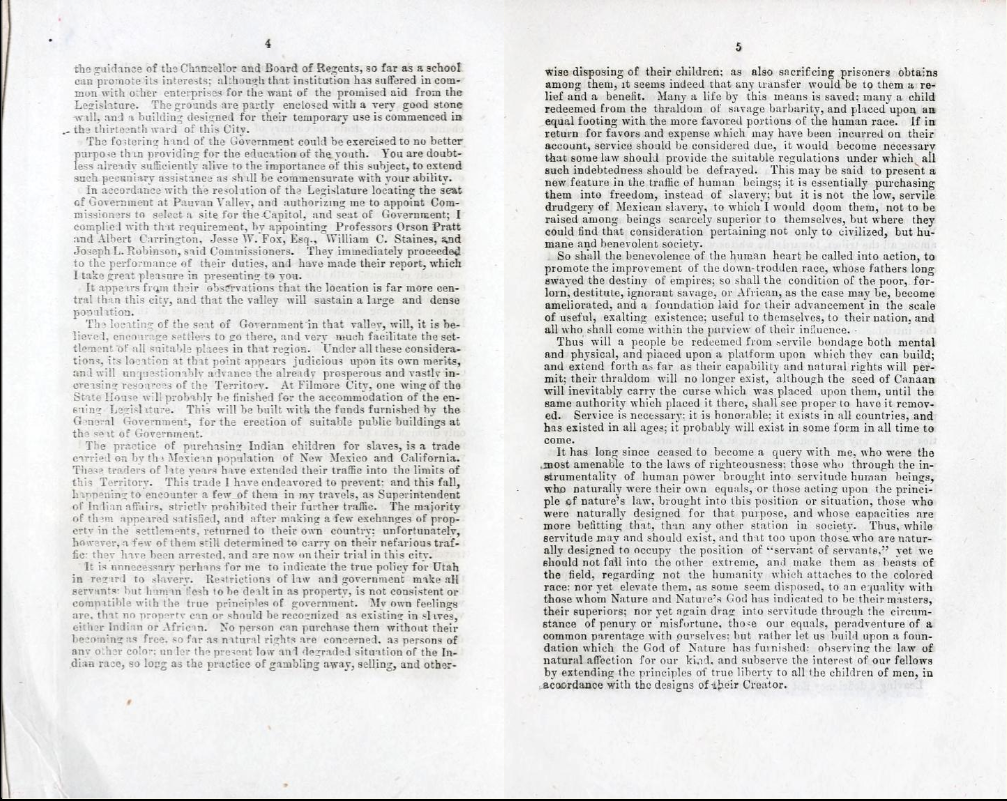Brigham Young addresses Native American slavery in an address to the Utah Territorial Legislature.
- Type
- Government Document
- Source
- Utah Territorial Legislature LDS
- Hearsay
- Scribed VerbatimReprint
- Reference
Brigham Young, "Governor's message, to the legislative assembly of Utah Territory, January 5, 1852," archive.org, 4-5
- Scribe/Publisher
- Utah Territorial Legislature
- Audience
- Reading Public
- Transcription
...
The practice of purchasing Indian children for slaves, is a trade carried on by the Mexican population of New Mexico and California. These traders of late years have extended their traffic into the limits of this Territory. This trade I have endeavored to prevent; and this fall, happening to encounter a few of them in my travels, as Superintendent of Indian affairs, strictly prohibited their further traffic. The majority of them appeared satisfied, and after making a few exchanges of property in the settlements, returned to their own country; unfortunately, however, a few of them still determined to carry on their nefarious traffic; they have been arrested, and are now on their trial in this city.
It is unnecessary perhaps for me to indicate the true policy for Utah in regard to slavery. Restrictions of law and government make all servants: but human flesh to be dealt in as property, is not consistent or compatible with the true principles of government. My own feelings are, that no property can or should be recognized as existing in slaves, either Indian or African. No person can purchase them without their becoming as free, so far as natural rights are concerned, as persons of any other color; under the present low and degraded situation of the Indian race, so long as the practice of gambling away, selling, and otherwise disposing of their children; as also sacrificing prisoners obtains among them, it seems indeed that any transfer would be to them a relief and a benefit. Many a life by this means is saved; many a child redeemed from the thraldom of savage barbarity, and placed upon an equal footing with the more favored portions of the human race. If in return for favors and expense which may have been incurred on their account, service should be considered due, it would become necessary that some law should provide the suitable regulations under which all such indebtedness should be defrayed. This may be said to present a new feature in the traffic of human beings; it is essentially purchasing them into freedom, instead of slavery, to which I would doom them, not to be raised among beings scarcely superior to themselves, but where they could find that consideration pertaining not only to civilized, but humane and benevolent society.
So shall the benevolence of the human heart be called into action, to promote the improvement of the down-trodden race, whose fathers long swayed the destiny of empires; so shall the condition of the poor, forlorn, destitute, ignorant savage, or African, as the case may be, become ameliorated, and a foundation laid for their advancement in the scale of useful, exalting existence; useful to themselves, to their nation, and all who shall come within the purview of their influence.
Thus will a people be redeemed from servile bondage both mental and physical, and placed upon a platform upon which they can build; and extend forth as far as their capability and natural rights will permit; their thraldom will no longer exist, although the seed of Canaan will inevitably carry the curse which was placed upon them, until the same authority which place it there, shall see proper to have it removed. Service is necessary; it is honorable; it exists in all countries, and has existed in all ages; it probably will exist in some form in all time to come.
It has long since ceased to become a query with me, who were the most amenable to the law of righteousness: those who through the instrumentality of human power brought into servitude human beings, who naturally were their own equals, or those acting upon the principle of nature's law, brought into this position or situation, those who were naturally designed for that purpose, and whose capacities are more befitting that, than any other station in society. Thus, while servitude may and should exist, and that too upon those who are naturally designed to occupy the position of "servant of servants," yet we should not fall into the other extreme, and make them as beasts of the field, regarding not the humanity which attaches to the colored race: nor yet elevate them, as some seem disposed, to an equality with those whom Nature and Nature's God has indicated to be their masters, their superiors; nor yet again drag into servitude through the circumstance of penury or misfortune, those our equals, peradventure of a common parentage with ourselves; but rather let us build upon a foundation which the God of Nature has furnished: observing the law of natural affection for our kind, and subserve the interest of our fellows by extending the principles of true liberty to all the children of men, in accordance with the designs of their Creator.
...
The B. H. Roberts Foundation is not owned by, operated by, or affiliated with the Church of Jesus Christ of Latter-day Saints.

